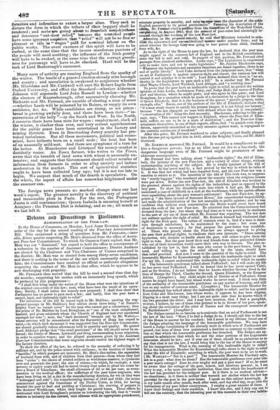Many sorts of activity are rousing England from the apathy
of the winter. The bustle of a general election already stirs borough and county ; and speculation is awakened to conjecture whether 11r. Gladstone and Mr. Cardwell will oust Sir Robert Inglis from Oxford University, and afflict the Standard—whether Alderman Johnson will supersede Lord John Russell in London—whether the electors of Knaresborough, after successively choosing Mr. Richards and Mr. Ferrand, are capable of electing a man of sense —whether Leeds will be poisoned by its Baines, or supply its own .antidotes, &c. &c. While candidates are rising, so are prices : bread is growing awfully dear, and there have been riots—" in- surrections of the belly "—in the South and West. In the North, cenverso there have been riots for wages : employment, slack all the winter, is slacker than ever, and very serious apprehensions for the public peace have been entertained in the factory and mining districts. Even in free-trading Jersey scarcity has pro- voked turbulence. But all these movements, political and econo- mical, have hitherto been on a small scale ; the heat has been of an unusually mild sort. And there are symptoms of a turn for the better. At Manchester and Liverpool the money-market is decidedly easier. An Essex farmer, who writes to the Times, avers that the breadth of land sown with wheat is unusually ex- tensive; and suggests that Government should collect returns of information from farmers in order to allay anxiety and induce moderation in the market. This sort of agricultural statistics ought to have been collected long ago; but it is not too late to begin. We suspect that much of the dearth is speculative. On the whole, the aspect of affairs has somewhat brightened under the summer sun.


























 Previous page
Previous page